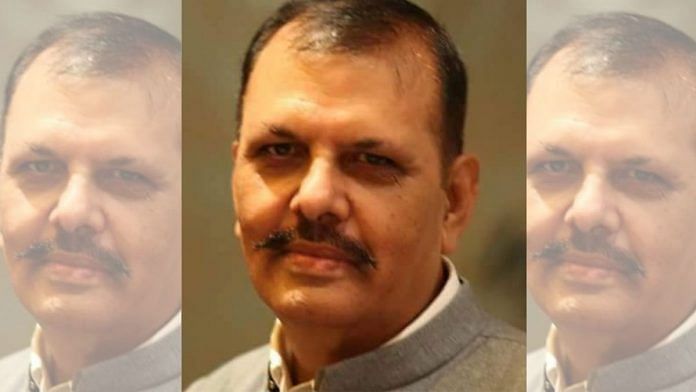New Delhi: Freedom fighter Bhagat Singh’s nephew, who has joined the thousands of protesting farmers camping at the Singhu border against the three farm laws passed by the Centre, said farmers are not misled by anyone as they are “educated and well aware of their rights”.
Abhay Singh Sandhu, 64, a horticulturist from Chandigarh, has been protesting at Singhu along with his wife for over ten days now.
Asked about claims of the ruling dispensation that the protesters are being misled, Sandhu said the farmers are well aware of their rights.
“These farmers are not like farmers of the past who were uneducated. These farmers are educated and well aware of their rights and are not being misled by anyone,” he said.
Sandhu said these demonstrations mirror the protest, popularly known as the ‘Pagdi Sambhal Jatta’, led by his grandfather and Bhagat Singh’s uncle Ajit Singh in 1906-1907 against the three agrarian laws passed by the British.
“Revolution has been part of my family’s legacy. In 1906, just like now, the British had passed farm reforms that were detrimental to farmers. At that time, my grandfather Ajit Singh started the agitation Pagdi Sambhal Jatta with Lala Lajpat Rai and others to get the laws repealed. The same thing is happening now with these three laws,” Sandhu told ThePrint.
2020 protests mirror 1906 movement
The three laws passed by the British in 1906 were the Doab Bari Act, Punjab Land Colonisation Act and the Punjab Land Alienation Act.
The laws enraged the farmers, who felt that the legislations would reduce them to contract workers in their own land. This led to unrest across Punjab, with the British government ultimately cancelling the three laws.
The movement was led by Ajit Singh, Kishan Singh (Bhagat Singh’s father) and Ghasita Ram to spark a revolution against the British. The movement later became popularly known as the Pagdi Sambhal Jatta movement after Banke Dayal’s poem by the same name was read out at a rally in 1907.
At Singhu border, Bhagat Singh and the Pagdi Sambhal Jatta movement continue to find expression with posters and books on the freedom fighter available across the protest site and frequent chants of the eponymous song ringing out of every nook and corner.
“The movement still resonates with the people of Punjab and the protesters here are inspired by it as well as Bhagat Singh,” said Sandhu.
“As a member of shaheed Bhagat Singh’s family, we are here to lend support to their voice and encourage them to keep the movement going,” he added.
Also read: 5 reasons why Modi govt is finding it difficult to tackle protesting farmers
Only member of Bhagat Singh’s family to join protest
Bhagat Singh was the eldest of five brothers — his other brothers were Kulbir Singh, Kultar Singh, Rajender Singh and Ranbir Singh.
Sandhu, who is Kulbir Singh’s son, is the only member of the freedom fighter’s family to have joined the protest.
“While some of my family members are still engaged in farming, only I have come here, with my wife, to lend support to the farmers’ cause,” Sandhu said.
According to him, his uncle Kultar Singh’s two sons are into farming in Uttar Pradesh.
Bhagat Singh’s brother Rajender had two sons, and both of them have died. Youngest brother Ranbir Singh’s son is a former Army major and daughter lives in Canada.
Sandhu himself has three siblings — one elder brother, who is no more, and two younger sisters, one residing in Punjab and the other in Canada.
Sandhu said the laws are “anti-farmer and that is why I am here to support them and fight for their rights”.
“As a horticulturist, I haven’t had any experience with the mandi system, but for years the mandi system has helped Punjab’s farmers get fair price for their produce and has sustained them for the six months when crops are harvested before they are sold,” he said.
“We have seen that with contract farming, contractors only buy the produce if market rates are high. If market rates are low, the farmer’s produce is not bought and the farmer is left hapless,” said Sandhu, who is living in a hotel near the Singhu border but spends his entire day at the protest site.
Also read: Farmers’ protest shows Modi’s politics is caught between India’s two middle classes




Those who are blinding supporting BJP and opposing farmers should go and see the land
I really want to understand how the horticulturist without having experienced the mandi system himself comes to the conclusion that “only” mandis benefit the farmers. Moreover, these laws do not take away the mandi system at all. These weird dichotomies in statements obviously beg a detailed explanation if not an allegation of being “misled”. Because making such statements itself shows how little they understand the laws themselves. The frequent changing of goalposts by the protesting organisations starting with MSP assurance to now increasing MSP is also evidence that there is really little clarity over what they are wishing to achieve. As a horticulturist, he himself sells produce to private players outside the mandi system and I am pretty sure an educated person like him would not be running a non profitable business at all.
It mirrors the Trade Union blackmail in Bengal when Communists ruled..with the external adorning of Sikh valour. Sikh valour no longer resembles the patriotism of the community. It has gone astray.